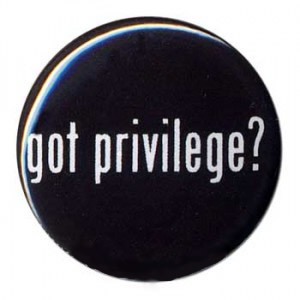Tonight I had the privilege of meeting Jose Antonio Vargas, a journalist who recently produced a film about the process of coming out as an undocumented immigrant. He reminded me that I have never known what it means to be an American. I have lived in Holland for eighteen years with a passport that I received based on my father’s nationality; I have owned a passport that has sat in a drawer for many years, while he has had many more years of giving back to a nation that disenfranchises him. Now I have started to question my place in my own country that faces immigration discrimination.
I have never come to terms with my privilege, a term that did not even enter my vocabulary until this year. In the past week I have compared my Dutch framework to the American society in which I struggle to situate myself. In recent days I have realized that I have known privilege in my very own homogeneous society, always lacking the vocabulary to describe what I saw.
My country has faced serious religious stratification since 1964. Labor shortages in Holland and unemployment rates in Turkey logically made a “recruitment agreement” with Turkey and other Middle Eastern countries seem like a logical step. A decade later their families started to follow the guest workers to the country where they had first been welcomed. Our government has been unable to accommodate the influx of immigrants, and sees the solution in placing them in asylum centers for an indeterminate time.
I have known for many years that not being Muslim in the Netherlands has made me privileged in so many ways. The education system benefits those who grew up in monolingual Dutch families by forcing twelve-year-olds to take a test, and segregating us into different high schools that basically define our future. Our conservative politicians speak of deporting immigrants, and condemn Islam. They have widened the schism between religious groups; demonize and dehumanize the immigrant population, causing illogical fears in people due to the supposed loss of their Dutch identity. Some political refugees come from corrupt and life endangering places to arrive in a supposedly “progressive country” to become faced with marginalization. They have become the folder in the immigration office that never gets read, the scapegoat to blame, and the uneducated in a corrupt educational system.
I have started a conversation with myself questioning my privilege. I have started to come to terms with the religious discrimination occurring in my own country. I still struggle to define my role as a white female in a US society that historically has stratified based on race. I cannot keep assuming that I am exempt from privilege in the US because I am foreign. I have opened the door to my questions, rendering me confused about the intersection of my identity with my nationalities. I hope to eventually turn this confusion into more clarity, but for now I face my privilege with more questions than I have answers.
If you would like to read more about immigration politics in the Netherlands, read this article.


It’s interesting how one sometimes needs to go to another place where discrimination is more blatant to realize those same systems in their own society. It reminded of when Gloria Steinem talked about how she went to India to study the caste system there in order to understand racism in America. It also shows how these systems of oppression that should be obvious are usually most invisible to the people socialized within them and who have the most potential to change them.
This also reminds me of the conversation we had before about dual nationalities and the role one can play in changing the places he/she both claims. Are we more one than the other? If so, what is our role in either context? As insider or outsider? An insider with outside info or an outsider with inside connections?